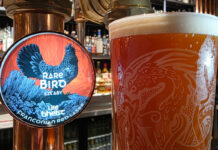Brewers predict further growth as category’s appeal broadens

WITH listings in major supermarkets and national pub chains, some people might argue that craft beer has moved into the ‘mainstream’.
But it seems the category’s popularity has only been a good thing for the on-trade, say brewers, who claim it has attracted new consumers.
Gerald Michaluk, owner of the Arran Brewery, said craft beer is “growing sharply”, while Paul Miller of Eden Brewery in St Andrews said “the trade is increasingly recognising the opportunity” of the category and that “many brewers seem to be broadening their offer to meet this”.
Miller highlighted “increasing numbers of mainstream consumers” who are becoming ‘beer literate’ with regards to the category.
James Watt, co-owner of Brewdog, echoed Miller’s sentiments, claiming that “beer drinkers are certainly becoming a lot savvier and discerning in their choices and are looking for quality and flavour from their beer”.
Consumers are now far more interested in what “makes a product high quality”, according to Bret Retallick, managing director of Broughton Ales.
“And of course, once they try a beer with real character, flavour and taste, there is no going back,” he said.
It’s a market being specifically targeted by the growing number of Scottish craft brewers.
Paul Fallen, of Fallen Brewing, said his company was formed with an emphasis on “ramping up the flavours to allow beer lovers to experience the full virtues of new world hops, the best malts and some weird and wonderful alternative ingredients”.
Dom South of Greene King, owner of Belhaven, said the rise of craft beer is part of a wider food and drink trend “where consumers are looking for richer experiences through quality, provenance and choice”.
South credited publicans for capitalising on this trend.
“The trade were very quick to spot that drinkers were getting more deeply interested in beer and have done a huge amount to nurture and encourage this interest, realising of course that draught beer is almost impossible to replicate at home so backing craft beer is a great way to keep people coming out to the pub,” said South.
Craft beer is definitely increasing its appeal with female drinkers.
Steve Stewart, owner of Edinburgh-based Stewart Brewing, also stressed the trade’s role in the rise of craft.
“More and more bars are stocking more and more craft beer; whether that be to support local breweries, to increase sales or to take part of the craft beer trend,” said Stewart.
And the category is helping broaden the appeal of beer to new drinkers.
Kenny Webster, managing director at the Isle of Skye Brewing Co, said craft beer is “definitely increasing its appeal with female and younger drinkers,” as it becomes “trendier”.
“Consumers overall are becoming more adventurous and open to experimentation, which has led to craft beer becoming more popular with the female drinker too,” said Webster.
Andrew Richardson of VC2 Brands, the firm behind Black Wolf Brewery, agreed craft beer has attracted “a wide range of new consumers”.
“There is definitely a lot of support and interest for craft beer from younger drinkers and women,” said Richardson.
With brewers in agreement that the category is growing and appealing to a broader consumer base, it should come as no surprise that James Davies of Alechemy Brewing believes there is “definitely a lot of scope for increasing sales”. “Doing good beers and doing it consistently will get you a name out there,” said Davies.
When it comes to craft beer, making a name for your outlet comes down to more than blackboards and posters. Davies highlighted the emergence of online craft beer communities as an area worth exploring for publicans.
“There is a lot of activity on Twitter among beer drinkers in this category and there are usually specific people/accounts out there that will help spread the word, telling people what you have on, etc,” said Davies.
Introducing new craft beers may attract new drinkers to a bar, but no publican wants to alienate the regulars.
Richard McLelland, director of sales at Williams Brothers and co-owner of craft beer bar The Vintage in Leith, said there is “a balance to be met” when it comes to range.
“Certainly at The Vintage we try to have a core range that’s stable – regulars like to have a regular beer – but also have a good rotating range,” said McLelland.
Accepting that not all bars will have the same draught capacity as The Vintage, which offers five rotating guest taps, McLelland still recommends finding room for guest beers to meet consumer demand.
“There’s only going to be more breweries now, so the palate will get wider,” he added.























